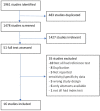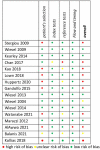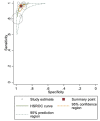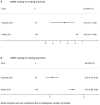Sensitivity and specificity of automated blood pressure devices to detect atrial fibrillation: A systematic review and meta-analysis of diagnostic accuracy
- PMID: 36035905
- PMCID: PMC9411860
- DOI: 10.3389/fcvm.2022.956542
Sensitivity and specificity of automated blood pressure devices to detect atrial fibrillation: A systematic review and meta-analysis of diagnostic accuracy
Abstract
Background: Atrial fibrillation (AF) is a prevalent and preventable cause of stroke and mortality.
Aim: This systematic review and meta-analysis aimed to investigate the sensitivity and specificity of office and out-of-office automated blood pressure (BP) devices to detect AF.
Methods: Diagnostic studies, extracted from databases such as Ovid Medline and Embase, on AF detection by BP device(s), electrocardiography, and reported sensitivity and specificity, were included. Screening of abstracts and full texts, data extraction, and quality assessment were conducted independently by two investigators using Covidence software. The sensitivity and specificity of the BP devices were pooled using a random-effects model.
Results: Sixteen studies including 10,158 participants were included. Only a few studies were conducted in primary care (n = 3) or with a low risk of bias (n = 5). Office BP devices, which utilised different algorithms to detect AF, had a sensitivity and specificity of 96.2 and 94%, respectively. Specificity was reduced when only one positive result was considered among consecutive BP measurements. Only a few studies (n = 3) investigated out-of-office BP. Only one study (n = 100) suggested the use of ≥79 and ≥26% of positive readings on 24-h ambulatory BP measurements to detect AF and paroxysmal AF, respectively.
Conclusions: Office BP devices can be used clinically to screen for AF in high-risk populations. Clinical trials are needed to determine the effect of AF screening using office BP devices in reducing stroke risk and mortality. Further studies are also required to guide out-of-office use of BP devices for detecting paroxysmal AF or AF.
Systematic review registration: https://www.crd.york.ac.uk/prospero/display_record.php?ID=CRD42022319541, PROSPERO CRD42022319541.
Keywords: atrial fibrillation; blood pressure; electrocardiogram (ECG); hypertension; meta-analysis; sensitivity and specificity.
Copyright © 2022 Tang, Yip, Yu, Wong and Lee.
Conflict of interest statement
The authors declare that the research was conducted in the absence of any commercial or financial relationships that could be construed as a potential conflict of interest.
Figures
References
-
- Papanastasiou CA, Theochari CA, Zareifopoulos N, Arfaras-Melainis A, Giannakoulas G, Karamitsos TD, et al. Atrial fibrillation is associated with cognitive impairment, all-cause dementia, vascular dementia, and Alzheimer's disease: a systematic review and meta-analysis. J Gen Intern Med. (2021) 36:3122–35. 10.1007/s11606-021-06954-8 - DOI - PMC - PubMed
Publication types
LinkOut - more resources
Full Text Sources





